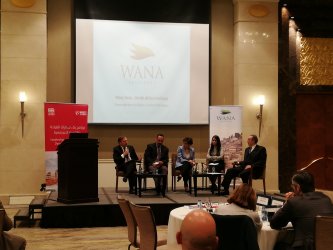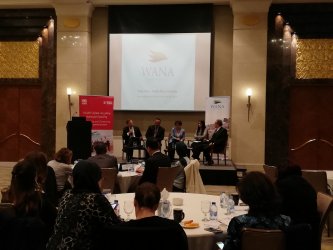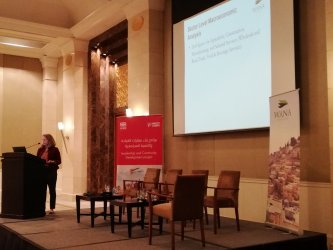-
Measuring the Impact of the Syrian Refugee Crisis on the ...
Measuring the Impact of the Syrian Refugee Crisis on the Jordanian Economy
The West Asia-North Africa (WANA) Institute and Mercy Corps held a high-level panel discussion on Wednesday to highlight their recent research findings on the impact of the Syrian refugee crisis on the Jordanian economy.
The panel consisted of Reem Goussous, Managing Director of Endeavor Jordan; Laith Al Qassim, Head of Jordan Compact Investments; Samar Muhareb, CEO of Arab Renaissance for Democracy and Development (ARDD); and Hunter Keith, Country Director of Mercy Corps. The event was moderated by HE Dr Omar Rifai, Director-General of the WANA Institute.
The WANA Institute and Mercy Corps have been measuring the impact of Syrian labour on Jordan’s economy since late 2016 for a UK Aid-funded project. The researchers estimate that in 2017 approximately 55 per cent of the 361,862 working-age Syrians were active in the Jordanian labour market.
While formal employment of Syrian refugees is limited to five economic activities — agriculture, construction, food and beverage services, manufacturing, and wholesale and retail trade — it appears that formalised work only accounts for a small proportion of overall Syrian refugee employment. As a result, Syrian labour participation has likely affected the wages of informal Jordanian workers, yet appears to have had little effect on the wages of formalised workers.
Researchers also looked at the growth patterns of the key sectors in which Syrians have been granted limited working rights — agriculture, construction, manufacturing, food, beverage, and accommodation services, and wholesale and retail trade. In the period between 2011 and 2016, agriculture, construction, manufacturing, and selected services all have exhibited varying patterns of GDP, employment, and investment growth. Analysis of these figures suggests that investing in agriculture is the most cost-effective way to boost employment and GDP, while investing in manufacturing is the least effective from a cost-benefit perspective.
The large number of refugees has also caused a ramp-up of assistance operations in Jordan led by international organisations and NGOs. This has created capacity-building opportunities for Jordanians and has led to the integration of technology such as the iris scan and access to assistance funds via ATM machines. These operations have created thousands of jobs for Jordanians within the humanitarian response sector as well as numerous indirect jobs across other sectors.
The researchers warn that a drawdown of these operations in the aftermath of a large-scale return would have profound consequences for all those who have gained employment or whose businesses have benefited as a result of the Syrian refugee population.




